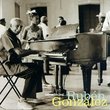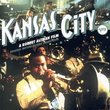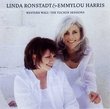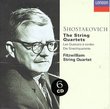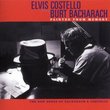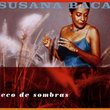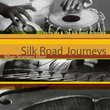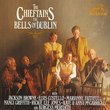| All Artists: Ruben Gonzalez Title: Chanchullo Members Wishing: 1 Total Copies: 0 Label: Nonesuch Original Release Date: 10/3/2000 Re-Release Date: 9/19/2000 Genres: International Music, Jazz, Latin Music Styles: Caribbean & Cuba, Cuba, Latin Jazz Number of Discs: 1 SwapaCD Credits: 1 UPCs: 075597950328, 769233006028 |
Search - Ruben Gonzalez :: Chanchullo
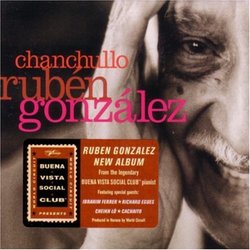 | Ruben Gonzalez Chanchullo Genres: International Music, Jazz, Latin Music
After starting off in an anxious mood with long, somewhat aimless jams, Chanchullo settles nicely into the gorgeous chemistry that made Introducing... Rubén González so incredibly magnetic. On the opening tr... more » |
Larger Image |
CD DetailsSynopsis
Amazon.com After starting off in an anxious mood with long, somewhat aimless jams, Chanchullo settles nicely into the gorgeous chemistry that made Introducing... Rubén González so incredibly magnetic. On the opening track, the 81-year-old virtuoso races at the piano like a horse charges from the gate, barely stopping until arriving at "La Lluvia," the percussion-inspired third song. From then on the ensemble elegantly glides along as González and his amazingly nimble arthritic fingers lead the band in a set of nostalgic danzóns, cha-chas, and other Cuban forms. The melodious violin and flute of "Central Constancia" spawns visions of the sweet little ballet class captured on the Buena Vista Social Club documentary and for which González regularly plays. Fellow Cuban star Ibrahim Ferrer sings on a couple of cuts, but unfortunately his part is too short on "De una Manera Espantosa" and the accompaniment too sloppy on "Choco's Guajira." Eliades Ochoa's unadorned contribution to "Quizás, quizás" is a highlight, as is the charming standard "El Bodeguero." A total of 21 musicians contribute to this album, but Chanchullo really only needs one: a pianist with a voracious appetite for life and immense talent. And it certainly has that. --Karen K. Hugg Similarly Requested CDs
|
CD ReviewsRUBEN, IS THE BEST Freddie Hernandez | los angeles, california United States | 10/24/2000 (5 out of 5 stars) "I have owned this wonderful CD for about 3 weeks and I can tell you this recording is even better than the first recording made by Ruben. Here you will have a chance to admire not only the piano of Ruben Gonzales, but also the amazing contributions made by some of the best cuban musicians. The first track, "Chanchullo" reminds me of the descarga (jam) that can be seen on the BVSC movie."Central Constancia" gets a unique touch with the violin and flutte. "Chocos Guajira" gets a great solo on tres by Papi Oviedo. "El Bodeguero" a great piece. I suggest you keep an ear on the great 66 seconds trombone solo by musical director Jesus "Aguaje" Ramos. "Isora Club" a wonderful piece with a solo on bass by Cachaito Lopez. "Rico Vacilon" well I have to admit it Ry Cooder was OK on his tres solo. Manuel "guajiro" MIrabal was amazing playing trumpet throughout the album. and of course The great Ibraim Ferrer. Get this recording, you will not be dissapointed at all." A Historical Cross Section of Cuban Music Jacob Elias | iowa city, ia | 11/13/2001 (5 out of 5 stars) "Chanchullo, by Ruben Gonzalez, perfectly showcases the array of specific styles that could fall under the blanket terms of Afro-Cuban jazz, Cuban swing or mambo. It also wonderfully showcases Gonzalez' technique and amazing ability to creatively improvise again and again. He uses the whole keyboard to lay out dazzling riffs, scales and patterns with amazing speed. It can be confusing but is always delightful. He alludes to countless other classic Cuban songs, and plays around with classical piano exercises. The first song, and title track, is one of those descargas by Israel López. The descarga is the Afro-Cuban sound stripped down to the bare essentials. Without an extensive melody or complex form, this is just an all out jam based on a simple bass riff. The first chords Gonzalez plays might make the song seem like it's going in the direction of a Dorian progression like "Oye Como Va." Once the band starts in it's apparent that it's in a different mode and a different mood, even though it's the same syncopated rhythm. After the catchy chorus finishes for the first time Gonzalez immediately starts an incredible solo. He dazzles the ears and mind with his sophisticated yet unrestrained style. He goes up, down, and all around the keyboards with incomprehensible chromatic patterns executed at top speed. After the initial moment of being awestruck, one wonders: "How does anyone, yet alone an eighty year old man who hasn't been playing for the last twenty years because of arthritis, do that?" Before you can catch your breath after his first solo, the horns start in and just blow you away. Mirabal and Ramos are joined Javier Zalba on baritone saxophone. They create such a full sound one can't believe there's only three horns playing. After that, the chorus sings it's lines, and then Gonzalez is at it again for another incredible solo. This is the song were Gonzalez shines the most, because it's basically him soloing all over the place with no other full fledged solos in the whole song. The chorus and horn riffs take a very minimal chunk away from Gonzalez in this five minute song. The next song, "De Una Manera Espantosa," is by Arsenio Rodriguez, and is a son montuno. This style is similar to a descarga and because it is another type of jam. The sharp trumpet solo by Mirabal, is followed by some improvised vocal lines by Ferrer, then, of course, Gonzalez on piano. The third song is another descarga and was created on the spot at the studio by the band and is a all out free for all jam of the highest level. Valdes and Diaz go crazy and Gonzalez plays like he's a percussionist. The first three songs are awesome, but they are all jams in the same mode. After three in a row it can seem repetitive or monotonous. It may have been better if they were spread throughout the album. The next song is "Central Constancia" by Enrique Jorrín. It is a danzón, which is a much softer song, demonstrated by the instrumentation including flutes and a violin. This song and the other danzón and similar chachachás on the disc seem completely opposite of the descargas and son montunos. These songs, although soft, have a very pleasant lilt and swing about them. The simple progressions are ideal vehicles for Gonzalez to play a little more relaxed, yet brilliant, piano solos. With his lyrical playing, the phrasing is perfect, and each note is precisely chosen. For those who are always looking for something familiar, there is "Quizas, Quizas" (in English "Perhaps, Perhaps.") Either you've heard Cake's quirky rock version of it, or heard it sung by the likes of Connie Francis or Doris Day. It's called a bolero cha. Bolero is the name for the great Cuban ballad, and "cha" is added to the end to say it's got a little more rhythm, a little more swing, a little more chachachá. Interestingly there is a guest appearance of the traditional Cuban guitarist Eliades Ochoa. Though he doesn't sing like he often does, he plays some very fine solos over this tune and adds a nice touch. The most traditional styled song on the album is "Choco's Guajira" dedicated to a Cuban trumpeter of the past. The guajira is the traditional Cuban lament, and this song is in the style of Arsenio Rodriguez, taking a traditional style and arranging it for a more modern big band mambo sound. Traditional elements are preserved by the invited guest Papi Oviedo on tres. The tres is a traditional Cuban instrument, much like a guitar but smaller. His solo along with Mirabal's are played in a beautiful traditional style, and of course another amazing solo by Gonzalez. These are coupled with the improvised vocals by Ferrer and another guest, Senegalese singer Cheikh Lô. This work presents a cross section of Cuban music, each style is demonstrated by the man who is probably the highest authority on this subject. This private music history lesson is some of greatest improvised music ever preformed by some of the greatest Latin musicians in the world. This is a great album for anyone who are already knows and loves Cuban music. For those who are unfamiliar with this genre, this album is a great place to start. Chanchullo is essential for any true music fan." Better than his first Michael A. Cirillo | Worcester, MA United States | 10/09/2000 (5 out of 5 stars) "I think this is an excellent CD. To my tastes the first one sounded like it was recorded in a bathroom (too much echo) and needed more of the other musicians to liven it up. This one fixes those problems and sounds like more time was spent on it. I really like the songs, the bigger band arrangements, and the sound. Mostly, I am amazed at Ruben's playing. To be that quick and fluid at any age is extremely impressive...at his age it's remarkable."
|

 Track Listings (11) - Disc #1
Track Listings (11) - Disc #1